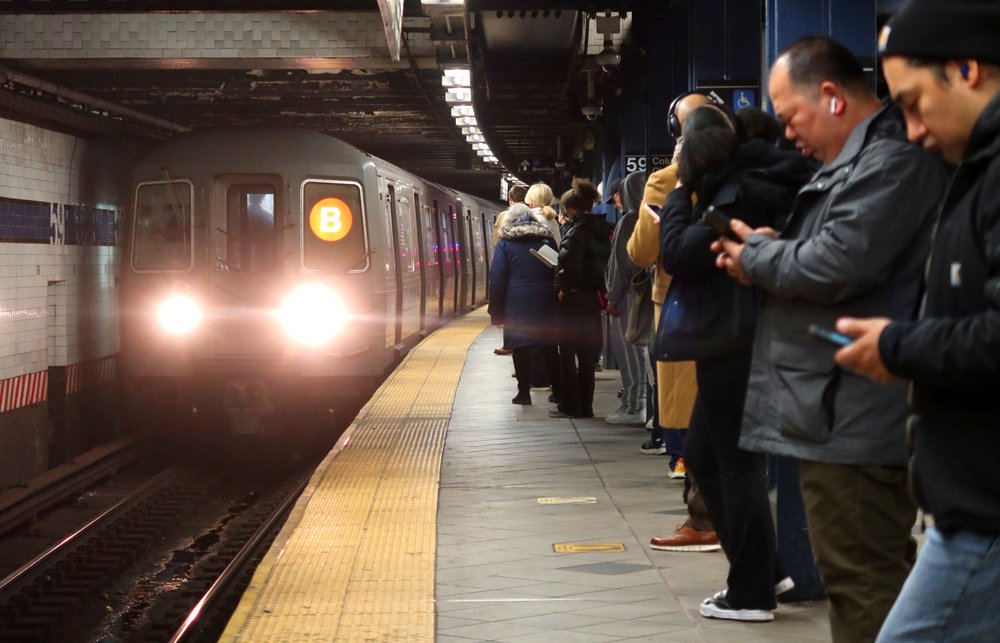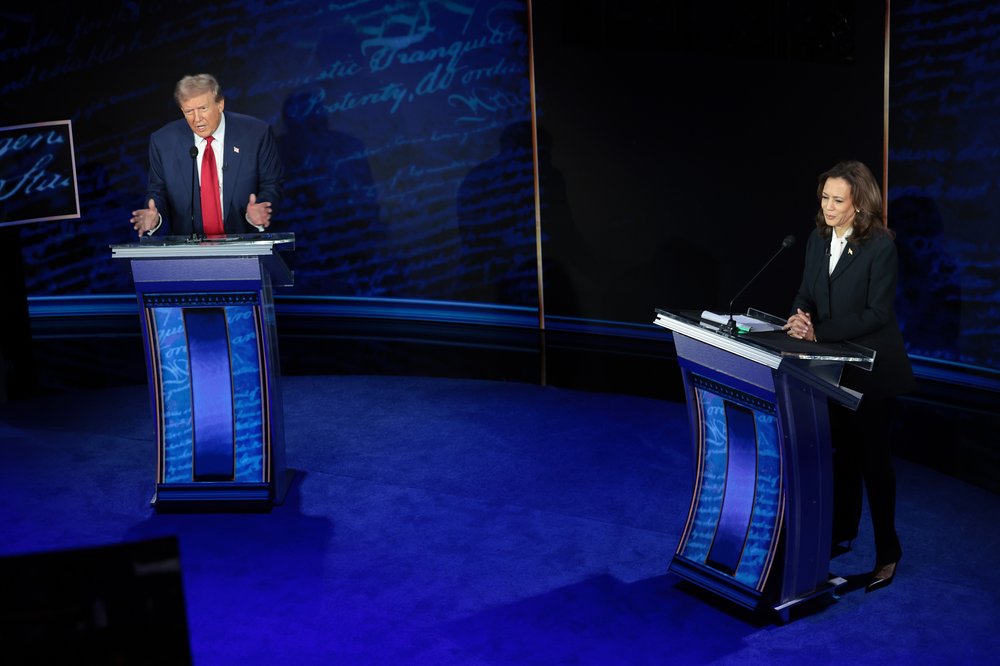What a Trump or Harris victory could mean for transit in NYC
Oct. 17, 2024, 6:01 a.m.
Experts said Vice President Harris' position on mass transit is nebulous but warned that federal funding for transit projects in New York would be strangled if former President Trump returns to office.

The future of major transit projects in and around New York City may hinge on next month’s presidential election between Vice President Kamala Harris and former President Donald Trump. But experts say no matter who wins the White House, the years of “Amtrak Joe” Biden pushing for big federal investments in transportation infrastructure are unlikely to return.
Neither candidate has focused on mass transit as they vie for votes in swing states that lack the types of sprawling subway, railroad and bus systems available in New York and New Jersey. But interviews with experts, advocates and a review of previous statements by both Trump and Harris offer a window into their positions on transportation.
Political and transit experts agree that a Trump presidency would strangle funding for federal transit grants across the region. They argue that while Harris’ position on the issue is much more nebulous, she would still make a concerted push for transit funding from Washington.
Even if Harris does win, it is unlikely she would be able to deliver anything for mass transit on the scale of Biden’s 2021 Bipartisan Infrastructure Law, said Regional Plan Association President Tom Wright. The legislation has funneled billions of dollars into New York transit projects like the Second Avenue subway, the installation of new station elevators and the construction of a new set of Hudson River train tunnels.
“This outgoing administration is going to have one of the great legacies in terms of mass transit. I really would struggle to think of any other president who's been as strong on this issue,” said Wright. “In comparison to that, we shouldn't expect that to continue, even under a Harris administration.”
Congestion pricing is on the ballot
Trump, for his part, has made his opinion on at least one New York City transportation issue crystal clear.
“TERMINATE Congestion Pricing in my FIRST WEEK back in Office!!” he wrote on his social media platform Truth Social in May, just weeks before New York Gov. Kathy Hochul abruptly paused the Manhattan tolling program right before it was supposed to launch.
Hochul’s move blew a $15 billion hole in the MTA’s construction budget. And while she has indicated she plans to move forward with a version of the tolls next year, Trump could kill it if he is inaugurated, because the program requires approval from the federal government.
“If Hochul doesn't want that to happen, she could start congestion pricing tomorrow,” said Nicole Gelinas, senior fellow at the Manhattan Institute think tank. “So that's something to keep in mind when you hear her potentially blaming Trump next year for congestion pricing.”
MTA officials previously blamed Trump for holding up congestion pricing when he was in office. They noted the U.S. Department of Transportation failed to provide guidance on which type of environmental review the tolls required, until Biden took office in 2021.
Harris has not taken a public position on congestion pricing, and her campaign did not respond to requests for comment for this story. Trump’s campaign also did not respond to inquiries.

The country’s largest transportation project
During his term in office, Democrats and transit advocates accused Trump of holding up funding for the Gateway Program, a massive project centered on the construction of new Hudson River train tunnels between Manhattan and New Jersey.
“President Trump continues to talk out of both sides of his mouth on infrastructure, simultaneously tipping the scales for some projects while at the same time holding up the nation's most urgent infrastructure need, the Hudson River Tunnel,” Brian Fritsch, campaign manager for the group Build Gateway Now, said in 2020.
At long last, the feds last year signed off on a $6.8 billion federal grant to help fund the tunnel work, marking the single largest federal grant for a public transportation project in American history. Combined with other programs, the U.S. government signed off on $12 billion in funding to build the new tunnels and repair the 114-year-old Hudson River tubes that were damaged during Hurricane Sandy in 2012. The project's organizers said that if Trump returned to office, he would have a hard time nixing the funding because it's part of a signed contract.
But he could hold up other parts of the Gateway Program that have not yet been funded, like the rebuilding of several rail bridges in New Jersey.
“I think the good news is that we would expect the tunnel project to continue moving, but there's a lot of other planning and eventually there will be federal funding necessary, and I don't think anyone thinks that that will have much of a chance of moving forward under a Trump administration,” said Wright of the Regional Plan Association.
Wright said it's unlikely that a Harris administration would do anything to slow the program. He noted that other Democrats, like former President Barack Obama, supported the initiative.
Harris’ mysterious stance on transit
There is virtually no mention of transportation in the 82-page policy book Harris released in September, about two months after Biden dropped out of the race. The platform points to a list of vague transportation goals but does not specify her mass transit priorities. It says the Harris administration would focus on “investing in aerospace, autos and other forms of transportation.”
When Harris first entered the U.S. Senate in 2017, she did suggest the country’s infrastructure crisis was tantamount to a human rights crisis. “Here's the truth: Infrastructure spending isn't a transportation issue for most Americans — it's a human rights issue,” she tweeted at the time.
Harris’ most concrete transportation platform came during her 2020 presidential campaign, when she explicitly encouraged people to use mass transit instead of cars. Her campaign’s policy platform in 2019 stated she wanted to “incentivize people to reduce car usage and use public transit.”
“This starts by funding robust public transportation networks to bring communities together and focusing our transportation infrastructure investments toward projects that reduce vehicle miles traveled and address gaps in first mile, last mile service,” the platform said. “By requiring that all new buses be zero-emission by 2030 and investing in local and regional transportation projects, we can eliminate emissions while connecting communities.”
These days, Harris’ mentions of automobiles tend to revolve around U.S. manufacturing. Her 2024 policy platform proposes a tax credit for American manufacturers and says Trump “ceded the production of the cars of the future to China” while he was in office.
In Project 2025, a plan to gut the U.S. Department of Transportation
One of Trump’s top campaign promises since 2016 has been to gut federal civil service jobs — or, as he puts it, “drain the swamp.” And Project 2025, a nearly 1,000-page blueprint created by the conservative Heritage Foundation, urges the next Republican president to steer the U.S. Department of Transportation away from supporting transit projects.
“DOT’s fundamental problem is that instead of being able to focus on providing Americans with affordable and abundant transportation, it has become saddled with congressional requirements that reduce the department to a de facto grantmaking organization,” the document notes.
Project 2025 calls for stricter scrutiny of the type of grants that fund major infrastructure programs in New York, like the Gateway Program or the MTA’s planned extension of the Second Avenue subway to East Harlem. It also calls for privatizing mass transit services currently operated by the public sector.
“Because Americans have demonstrated a strong preference for alternative means of transportation, rather than throwing good money after bad by continuing federal subsidies for transit expansion, there should be a focus on reducing costs that make transit uneconomical,” Project 2025’s transportation section states. “The Trump administration urged Congress to eliminate the CIG [Capital Investment Grant] program, but the program has strong support on Capitol Hill. At a minimum, a new conservative administration should ensure that each CIG project meets sound economic standards and a rigorous cost-benefit analysis.”
The blueprint also takes aim at pensions and health care costs for unionized transit workers, calling those “fringe benefits." It urges the next president to ultimately “remove federal subsidies for transit spending, allowing states and localities to decide whether mass transit is a good investment for them.”
Trump has claimed he is not involved in Project 2025, but the document was nonetheless authored by his allies and advisers.
Harris has repeatedly referenced Project 2025 during her campaign, saying she opposes nearly all its contents.
MTA Chair Janno Lieber makes as much money as President Biden Should the MTA kill the IBX and 2nd Ave projects? Former officials give unvarnished thoughts Buttigieg approves $3.4B grant for 2nd Avenue subway, less than half the project’s cost